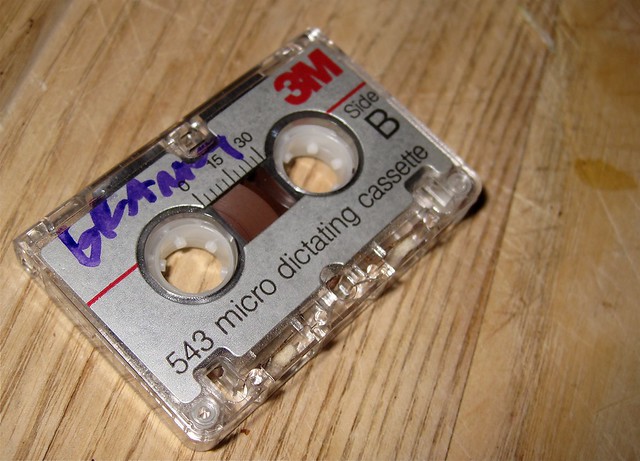The calendar reminder notifies me that yesterday would have been my grandmother’s 113th birthday. If I could talk to her, I’d tease about that being a lucky number. She would laugh that cackle I loved hearing.
What I do have is audio I recorded with her in 1994 on actual tape (micro-cassette) .

Granny’s Tape flickr photo by cogdogblog shared into the public domain using Creative Commons Public Domain Dedication (CC0)
I’ve had a long unfinished project of publishing these to TapeWrite a nifty site to annotate audio with text, images, or quotes. This episode was me asking about her early years of being married to my grandfather, Abraham (or Abe) for whom I am named after. Other voices include my sisters, my Dad, and my Mom in the background.
The thing I always liked about this segment, and I only picked up on later listening, was how Abraham’s father made him quit school to apprentice as a bricklayer.
Grandma cleary says, “I made home go back to school” and she mentioned the name of an International Correspondence School (ICS), which, as she says is still around. I already wrote some about my grandfather being distance learner. There’s some history about ICS from the University of Scranton, it’s start in providing educational opportunities to the working class. And there is more from “Education for Success”: The International Correspondence Schools of Scranton, Pennsylvania (1996, The Pennsylvania Magazine of History and Biography).
This is what my grandfather’s education took advantage of; the technical infrastructure of the postal system.
The tremendous success of ICS was the result of demand, an excellent product, a superb organization, prescient marketing and advertising, as well as a few happy coincidences. ICS’s managers became adept at using available resources and new technologies to their best advantage. For instance, without a well-developed mail and parcel post system, no correspondence system could have succeeded. By the time that ICS began selling its correspondence courses, the United States Post Office had eleven major mail distribution centers, stretching from Boston and New York to St. Paul and Fort Worth. These centers handled nearly eight billion pieces of mail annually over 140,000 miles of rail lines. Additionally, the U.S. Post Office instituted its rural free delivery system (RFD) in 1891. By 1916 three million people were served by RFD. ICS made the mailing process even easier by sending self-addressed envelopes to their students along with their books and instruction papers. And, although the U.S. Post Office did not begin its parcel post service until 1913, ICS’s textbooks could be delivered by any one of the four independent parcel delivery companies.
“Education for Success” (Watkinson, 1996) https://journals.psu.edu/pmhb/article/viewFile/45108/44829
Because the ICS’s focus was applied skills, not theory, it skipped the textbook approach (cough, cough, cough):
To achieve this goal, ICS did not instruct its students by standard textbooks, which, it contended, often contained considerable amounts of extraneous material and “demand[ed] too great a knowledge of mathematics and other subjects/’ Rather, ICS created its own specially prepared, leatherbound “Instruction and Question Papers” (themselves a major selling point and marketing tool), which gave exactly the information a pupil needed, and questioned him only on that material.
“Education for Success” (Watkinson, 1996) https://journals.psu.edu/pmhb/article/viewFile/45108/44829
Because the only real requirement for study was that the student be able to read and write English well enough for the school to communicate with him, or her, the language employed in the texts was simple and the illustrations profuse.
The more colorful part of her story was the description of her father-in-law, whom I thought was always referred to as “the old man”. Israel Levine was described as “nasty” and was disowned by his own family:
“He was a nasty person. Nobody liked him. He drank. He had other women. This has to all go down in history, right?”
I tried to find some info on him, it seems his name is listed as “Iseral” Levine, this entry in Ancestry.com seems to match on dates and his wife’s name of “Yetta”.

I still have 7 more episodes to work on, Granny, please be patient! And happy birthday, I miss you.
Featured Image: My own photo of the framed photos of my grandparents, these were in the basement of our family home, likely photographed again at my Mom’s house in Florida.



Love this story. So special to have the recording and to be able to have those stories. I only remember one of my grandparents, my paternal grandma. She used to come and stay with us for 3 months every year and always told us the same few stories. Maybe one day, I’ll write them down.
Thanks for sharing Grandma’s voice! But it is bitter sweet – I have not recorded any parents or grandparents – I cannot remember their voices – and that makes me sad…
Wow, that was so interesting. I don’t remember Dad talking about his grandfather except when he described their Passover seders when he was young. I didn’t know about how our grandfather became an engineer either. Get the rest published!
Hey sister, I gave you a copy of the full audio on CD! I can ship you the mp3 files